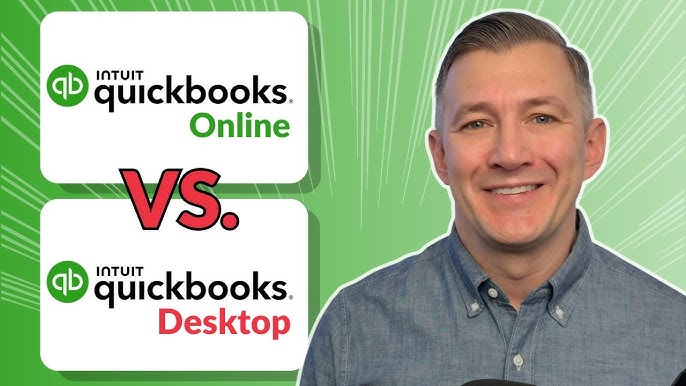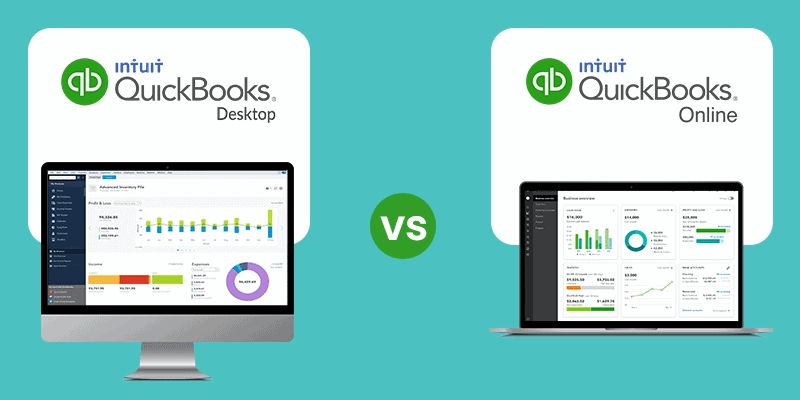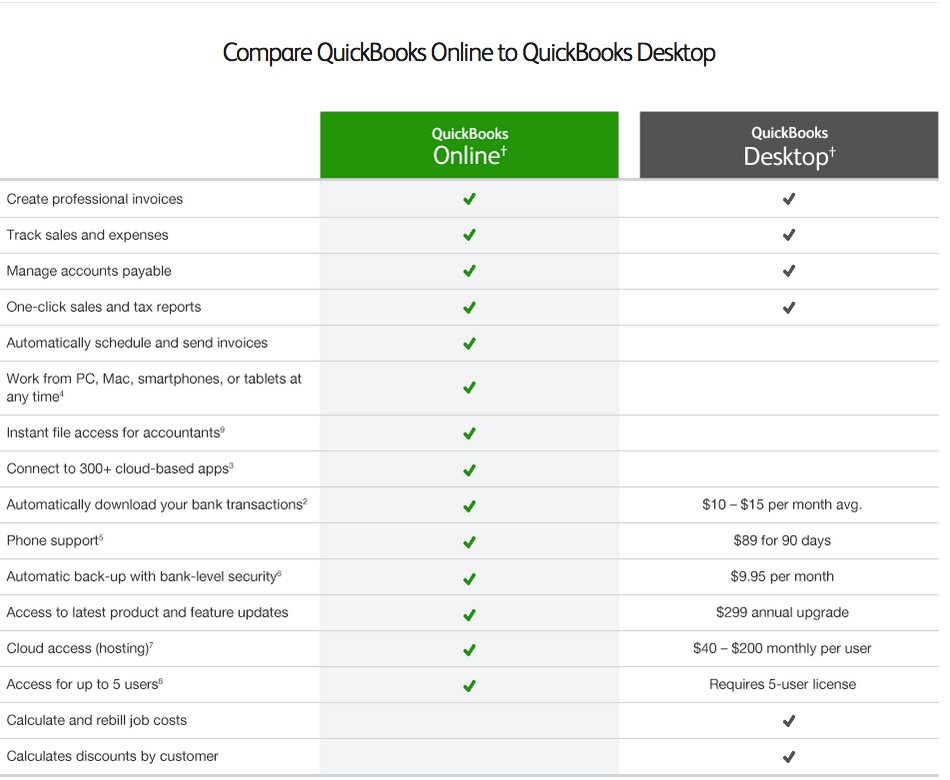Are you trying to decide between QuickBooks Online and QuickBooks Desktop for your business? You’re not alone.
Many business owners find themselves weighing the costs and benefits of each option to figure out which best fits their needs. Understanding the financial impact is crucial, but there’s more to consider than just the price tag. Which platform will save you time?
Which one offers the features you need to streamline operations? We’ll dive into the cost differences between QuickBooks Online and Desktop, helping you make an informed decision. By the end, you’ll have a clear picture of which version aligns with your budget and business goals. Stick with us, and unravel the mysteries behind these popular accounting tools.
Quickbooks Online Pricing
QuickBooks Online offers a flexible pricing model suitable for various business sizes. Its subscription plans are designed to meet diverse accounting needs, making it accessible for freelancers and enterprises alike. Understanding the pricing structure helps you choose the right plan for your business.
Subscription Models
QuickBooks Online has multiple subscription models. Each plan varies in features and cost, providing options for different business requirements. The Simple Start plan is the most basic. It suits single-user operations with essential features. The Essentials plan allows three users, offering more advanced features. The Plus plan includes five users. It provides comprehensive tools for managing finances. For bigger teams, the Advanced plan supports up to 25 users. This plan is ideal for larger businesses.
Features Included
Each subscription plan includes distinct features. Simple Start offers income and expense tracking. Essentials adds bill management and payment options. Plus includes inventory tracking and project management. Advanced provides custom reporting and dedicated support. Choosing the right plan ensures you have the necessary tools. Consider features that align with your business goals.

Credit: www.youtube.com
Quickbooks Desktop Pricing
QuickBooks Desktop offers a one-time purchase, unlike QuickBooks Online’s monthly subscription. This difference affects long-term costs. Small businesses may prefer the Desktop version for its upfront pricing, while others might choose Online for its flexibility.
Understanding the cost of QuickBooks Desktop can be essential for businesses looking to manage their finances efficiently. QuickBooks Desktop offers a range of features tailored to specific business needs, but the pricing structure might seem complex at first glance. It’s crucial to weigh the costs against the benefits to ensure you’re making the right choice for your business.Licensing Options
QuickBooks Desktop provides several licensing options, allowing you to choose based on your business size and requirements. You can opt for a one-time purchase with a perpetual license. This means you pay once and own the software, which could be cost-effective in the long run.Another option is the annual subscription, which gives you access to the latest features and updates. If you’re someone who values having the most recent tools at your disposal, this might be a better fit.Have you ever considered how much flexibility you need with your software updates?Features Included
With QuickBooks Desktop, you get a robust set of features designed to simplify your accounting tasks. It includes comprehensive reporting tools, payroll management, and inventory tracking. These are vital for businesses that need detailed financial oversight.QuickBooks Desktop also offers industry-specific solutions. Whether you’re in manufacturing, retail, or construction, you can find features tailored to your sector. This specificity can save you time and make your financial processes more intuitive.Consider how these features align with your business operations. Are there specific tools you can’t do without?Choosing between QuickBooks Desktop and Online often boils down to what you value more: the depth of features or the flexibility of use. Understanding the pricing and features can guide you to the best decision for your needs.Hidden Costs And Fees
When deciding between QuickBooks Online and Desktop, the initial cost is just the tip of the iceberg. Hidden costs and fees can surprise you if you’re not prepared. It’s essential to understand these additional expenses to make a wise choice for your business. Being aware of these hidden costs can prevent unexpected financial strain. You might wonder, what are these hidden fees, and how do they affect your budget?
Additional Services
QuickBooks Online offers various additional services that come with extra fees. Need payroll services? You’ll pay for that separately. Want to track inventory? That’s another add-on. Each service enhances functionality but comes at a cost.
QuickBooks Desktop also has add-ons, but they might differ from the online version. Consider what services your business truly needs. It’s easy to get carried away with options, but each choice impacts your bottom line.
Ask yourself: Do you need all these services now, or can you add them later as your business grows?
Upgrade Costs
Upgrading QuickBooks Desktop can be costly. Each new version may require purchasing new licenses. This means spending more money than expected over time.
QuickBooks Online automatically updates without extra charges. However, certain features may require upgrading to a higher tier plan. It’s a trade-off between predictable costs and flexibility.
Think about how often you want to upgrade and the implications on your budget. Are frequent upgrades worth the additional costs?
Ultimately, understanding these hidden costs and fees helps you avoid surprises. Carefully weigh the additional services and upgrade costs. Make informed decisions that align with your business needs and financial capacity. Your business deserves the best tools without hidden financial burdens.

Credit: www.thesagenext.com
Cost Comparison
QuickBooks Online typically involves a monthly subscription fee, offering flexibility and cloud access. QuickBooks Desktop requires a one-time purchase or annual payment, providing robust features for complex accounting needs. Users must weigh costs against their business requirements.
When deciding between QuickBooks Online and QuickBooks Desktop, cost is a major factor. Each version offers different pricing structures and benefits. Understanding these differences can help you make an informed decision.Long-term Value
QuickBooks Online typically operates on a subscription model. You pay a monthly fee, which includes updates and support. This can be beneficial if you prefer predictable expenses.In contrast, QuickBooks Desktop often requires a one-time purchase. While it might seem costly upfront, there are no recurring monthly fees. Consider how often you’ll need updates and if the newer features justify the cost.Weigh the pros and cons of each. Would you rather pay less upfront or have ongoing costs with the latest features?Scalability
QuickBooks Online offers flexibility as your business grows. You can easily upgrade your plan or add features as needed. This is ideal if you anticipate scaling your operations.With QuickBooks Desktop, adding new features or users can be more complex. You might need to purchase additional licenses or even a new version. Think about your business’s growth trajectory.Have you ever found yourself needing more from your accounting software as your business expanded? QuickBooks Online could be the answer.User Experience Impact
Choosing between QuickBooks Online and Desktop can significantly impact your user experience. Both platforms offer unique advantages, but how they affect ease of use and customer support can make or break your decision. Let’s dive into these aspects to help you make an informed choice.
Ease Of Use
QuickBooks Online shines with its intuitive interface. It’s designed for simplicity, making it easy for users to navigate, even if you’re new to accounting software.
Imagine logging in from anywhere, on any device, with real-time updates at your fingertips. This flexibility is a game-changer for busy entrepreneurs who need access on the go.
In contrast, QuickBooks Desktop offers a robust set of features but can feel overwhelming to newcomers. Its complex setup might demand more time and patience.
Consider your comfort level with software. Do you prefer simplicity or are you willing to invest time for a deeper set of tools?
Customer Support
When it comes to customer support, QuickBooks Online provides a seamless experience with 24/7 chat support. You can resolve issues quickly, without waiting for business hours.
Have you ever faced a technical glitch and wished for instant help? QuickBooks Online ensures you’re not stranded, offering instant assistance.
On the other hand, QuickBooks Desktop offers phone support during business hours. While it provides personalized assistance, it might not be as immediate as online support.
Think about your preference for support availability. Is immediate support crucial for your business operations?
Ultimately, your choice between QuickBooks Online and Desktop should align with your user experience priorities. Whether it’s ease of use or customer support, understanding these elements can lead to a smoother financial management journey.
Business Suitability
Choosing between QuickBooks Online and Desktop depends on your business needs. Each version offers unique features that suit different types of businesses. Understanding these can help you make an informed choice.
Industry Needs
Some industries need specific accounting features. QuickBooks Desktop often serves industries like manufacturing and construction well. These sectors need robust inventory management and job costing. QuickBooks Online suits service-based businesses. It offers flexibility and anytime access, crucial for remote work.
Consider your industry requirements carefully. This helps in choosing the right QuickBooks version. Think about the nature of your transactions and operations. Do you need advanced reporting or real-time access? Different industries have varied needs. QuickBooks Online and Desktop meet these needs differently.
Business Size
The size of your business impacts your QuickBooks choice. Small businesses often prefer QuickBooks Online. It’s easy to use and offers flexibility. It suits businesses with fewer transactions. Growing businesses might choose QuickBooks Desktop. It handles complex accounting needs better.
Larger businesses require advanced features. QuickBooks Desktop provides these features. It can manage large datasets efficiently. Small enterprises benefit from QuickBooks Online’s simplicity. It offers essential features without the complexity.
Making The Decision
Choosing between QuickBooks Online and Desktop involves considering costs. Online version charges monthly fees, while Desktop requires a one-time purchase. Consider how often updates are needed and how you prefer to pay.
Deciding between QuickBooks Online and QuickBooks Desktop can be overwhelming. Each option has its own set of advantages and limitations. Choosing the right one for your business often boils down to assessing your specific needs and priorities.Budget Considerations
Your budget plays a significant role in this decision. QuickBooks Online typically operates on a subscription model. This means you’ll pay a monthly fee, which can be easier to manage in terms of cash flow.On the other hand, QuickBooks Desktop usually requires a one-time purchase, often with optional annual updates. This can be more cost-effective in the long run, but it requires a larger initial investment. Think about your cash flow stability. Can you afford a larger upfront cost, or do smaller monthly payments suit your financial situation better?Feature Prioritization
Consider what features are crucial for your business operations. QuickBooks Online offers cloud-based access, which is perfect for teams needing flexibility and remote access. It’s user-friendly and integrates well with other online tools.In contrast, QuickBooks Desktop is known for its robust features and customizability. It can handle complex accounting needs and large volumes of data. If your business requires detailed reporting and advanced inventory management, this might be the better choice.Reflect on your daily operations. Do you need mobility and real-time collaboration, or do you prioritize comprehensive features and control over your software? Balancing your feature needs with your budget can lead you to the best decision for your business.
Credit: www.stepbystepquickbookstutorial.com
Frequently Asked Questions
What Is The Cost Difference Between Quickbooks Online And Desktop?
QuickBooks Online has a monthly subscription model, starting at $25/month. QuickBooks Desktop requires a one-time purchase starting at $349. 99. Online offers flexibility with automatic updates, while Desktop may have more robust features for complex needs. Pricing can vary based on specific plans and additional features.
What Are The Disadvantages Of Quickbooks Online?
QuickBooks Online requires a stable internet connection, and some features may be limited compared to the desktop version. Subscription costs can add up over time. Users may experience occasional syncing issues with bank accounts. Customization options are somewhat restricted. Data security depends on internet safety measures.
How Much Does Quickbooks Online Cost Per Year?
QuickBooks Online costs vary by plan. Simple Start is $300/year, Essentials is $600/year, and Plus is $900/year. Pricing may change, so check Intuit’s website for updates.
Conclusion
Choosing between QuickBooks Online and Desktop depends on your needs. QuickBooks Online offers flexibility and remote access. It’s ideal for businesses on the go. QuickBooks Desktop provides powerful features for detailed accounting. Suitable for businesses needing advanced reporting. Consider the costs and benefits of each version.
Think about your business size and workflow. Subscription fees for Online can add up over time. Desktop has a one-time purchase cost. Evaluate your budget and requirements. Both options provide reliable accounting solutions. Make an informed decision for your business success.






